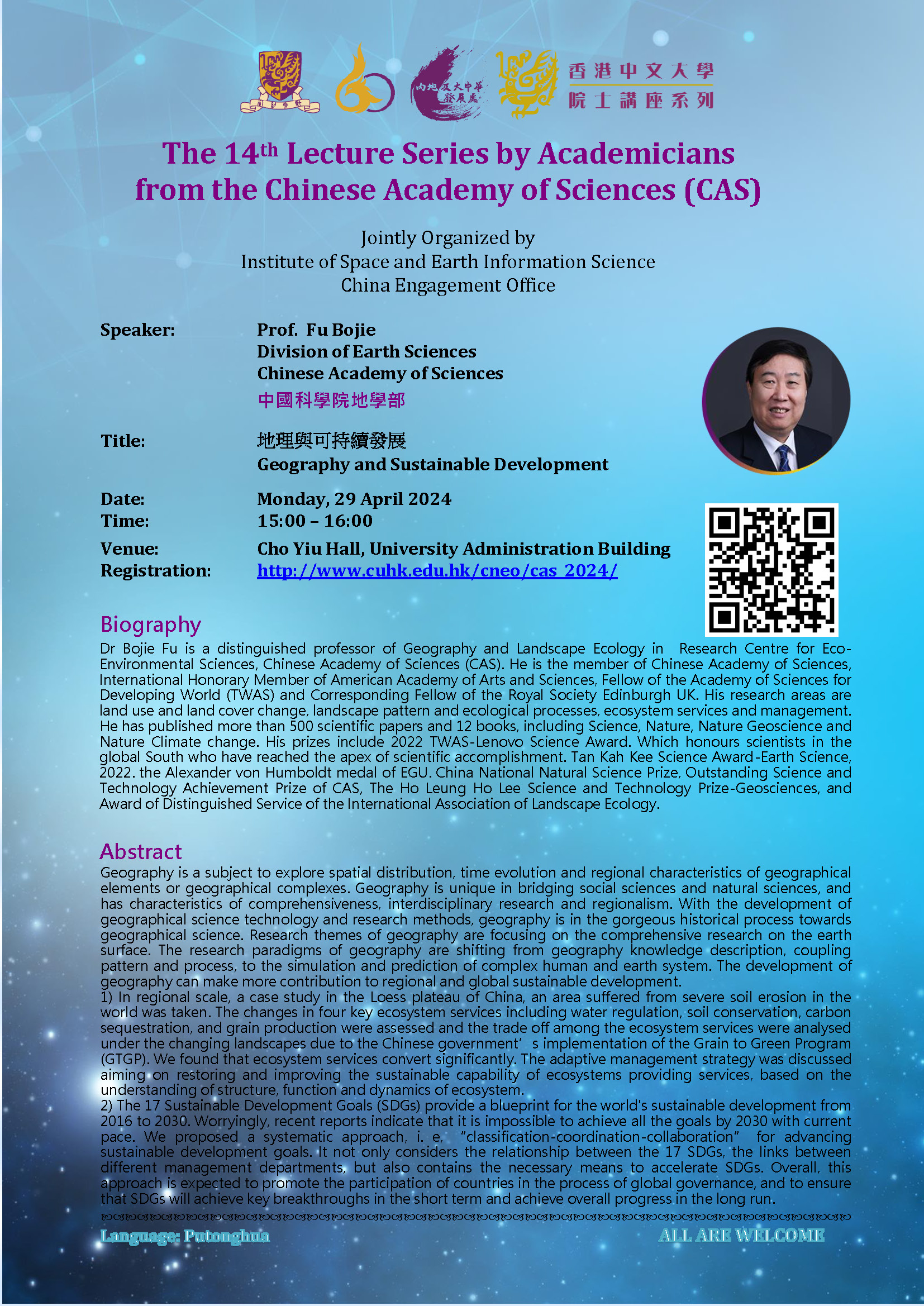活動
「中國科學院院士講座系列」(2024年4月29日)
2024年4月29日
15:00 – 16:00
Cho Yiu Hall, University Administration Building, CUHK
Prof. Fu Bojie
Division of Earth Sciences Chinese Academy of Sciences
Chinese Academy of Sciences
Prof. Bojie Fu is a distinguished professor of Geography and Landscape Ecology in Research Centre for Eco- Environmental Sciences, Chinese Academy of Sciences (CAS). He is the member of Chinese Academy of Sciences, International Honorary Member of American Academy of Arts and Sciences, Fellow of the Academy of Sciences for Developing World (TWAS) and Corresponding Fellow of the Royal Society Edinburgh UK. His research areas are land use and land cover change, landscape pattern and ecological processes, ecosystem services and management. He has published more than 500 scientific papers and 12 books, including Science. Nature. Nature Geoscience and Nature Climate change.
His prizes include 2022 TWAS-Lenovo Science Award which honours scientists in the global South who have reached the apex of scientific accomplishment; Tan Kah Kee Science Award-Earth Science. 2022; the Alexander von Humboldt medal of EGU; China National Natural Science Prize; Outstanding Science and Technology Achievement Prize of CAS; The Ho Leung Ho Lee Science and Technology Prize-Geosciences; and Award of Distinguished Service of the International Association of Landscape Ecology.
Geography is a subject to explore spatial distribution, time evolution and regional characteristics of geographical elements or geographical complexes. Geography is unique in bridging social sciences and natural sciences, and has characteristics of comprehensiveness, interdisciplinary research and regionalism. With the development of geographical science technology and research methods, geography is in the gorgeous historical process towards geographical science. Research themes of geography are focusing on the comprehensive research on the earth surface. The research paradigms of geography are shifting from geography knowledge description, coupling pattern and process, to the simulation and prediction of complex human and earth system. The development of geography can make more contribution to regional and global sustainable development.
1) In regional scale, a case study in the Loess plateau of China, an area suffered from severe soil erosion in the world was taken. The changes in four key ecosystem services including water regulation, soil conservation, carbon sequestration, and grain production were assessed and the trade off among the ecosystem services were analysed under the changing landscapes due to the Chinese government’s implementation of the Grain to Green Program (GTGP). We found that ecosystem services convert significantly. The adaptive management strategy was discussed aiming on restoring and improving the sustainable capability of ecosystems providing services, based on the understanding of structure, function and dynamics of ecosystem.
2) The 17 Sustainable Development Goals (SDGs) provide a blueprint for the world’s sustainable development from 2016 to 2030. Worryingly, recent reports indicate that it is impossible to achieve all the goals by 2030 with current pace. We proposed a systematic approach. I. e, “classification-coordination-collaboration for advancing sustainable development goals. It not only considers the relationship between the 17 SDGs, the links between different management departments but also contains the necessary means to accelerate SDGs. Overall, this approach is expected to promote the participation of countries in the process of global governance, and to ensure that SDGs will achieve key breakthroughs in the short term and achieve overall progress in the long run.
Jointly Organized:
Institute of Space and Earth Information Science
China Engagement Office


